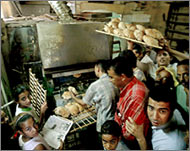Bread shortage hits Egypt
Egyptians are growing worried about a shortage of bread gripping the country, especially with children returning to school.

Newspapers have for days been reporting shortages of bread, which is subsidised by the state. Long queues of customers have formed outside bakeries in the capital Cairo.
The situation is expected to come to a head on Saturday when summer holidays end and hundreds of thousands of children return to the classroom.
Observers say the problem stems from a national flour shortage caused by a below average wheat harvest, technical problems at mills and higher international wheat prices.
Directives
The Egyptian government says it has taken action to solve the problem which started several weeks ago.
“Egyptian President Hosni Mubarak issued directives to increase daily bread production by 10% to attain 210 million loaves per day,” Information Minister Safwat Sherif told reporters.
Bread is one of 25 essential food items subsidised by the state. It is supposed to sell for five piasters (less than one cent) a loaf.
 |
|
Egyptians scramble to grab bread |
An increase in the price in 1977 provoked violent protests that were dubbed the “bread riots.”
One customer in a working-class Cairo neighbourhood near the Great Pyramids said the shortage of government-subsidised bread amounted to a “crisis” for some people.
“It’s difficult to find a bakery that sells bread at the government price,” Said said, adding that the cheapest his wife could find most days was 10 piasters.
He said he also suspects the loaves are getting smaller.
In the capital’s Dokki neighborhood, a woman was visibly upset when a bakery stopped selling subsidised bread at the noon deadline.
“What’s this? I’ve been waiting 10 minutes and when my turn comes, they tell me there’s no bread,” she screamed.
Black market
One Cairo baker, Gamal Ibrahim, said that the shortage of the round, flat bread was partly “due to the sale of subsidised flour on the black market.”
But he said the government had pledged to step up deliveries of subsidised flour by Saturday to meet an expected rise in demand due to children returning to school.
“Long lines have been forming for about a month,” he said, as around a dozen people stood outside his shop.
Magdi Issa, vice president of the Cereal Industries Union, said a tonne of subsidised flour is sold for 400 Egyptian pounds less than the market price to some 3,500 of the 6,800 bakeries across the country.
|
“What’s this? I’ve been waiting 10 minutes and when my turn comes, they tell me there’s no bread” Woman in bread queue |
The professional baker’s association, meanwhile, has reported the price of a tonne of wheat has risen to 1,650 pounds ($270 dollars) from 980 pounds ($150).
The liberal opposition daily Al-Wafd complained that, with the return to school approaching, “a state of emergency has been declared in all homes” which are suffering from rising costs of school items, including uniforms.
Bankers in Cairo say the cost of living has risen by 10%for the poorest people and some 20% for the middle class, as the pound continues a long devaluation and the growing cost of imports trickles through.
“All the problems in Egyptian society – education, bread, unemployment, population density, or economic – are a result of the population explosion,” said President Mubarak.
He added that the population had increased by 30 million people since 1981 to reach 70 million people today.